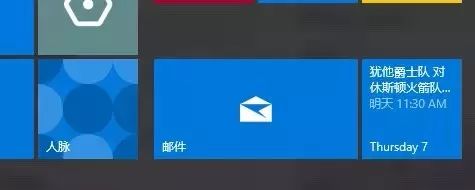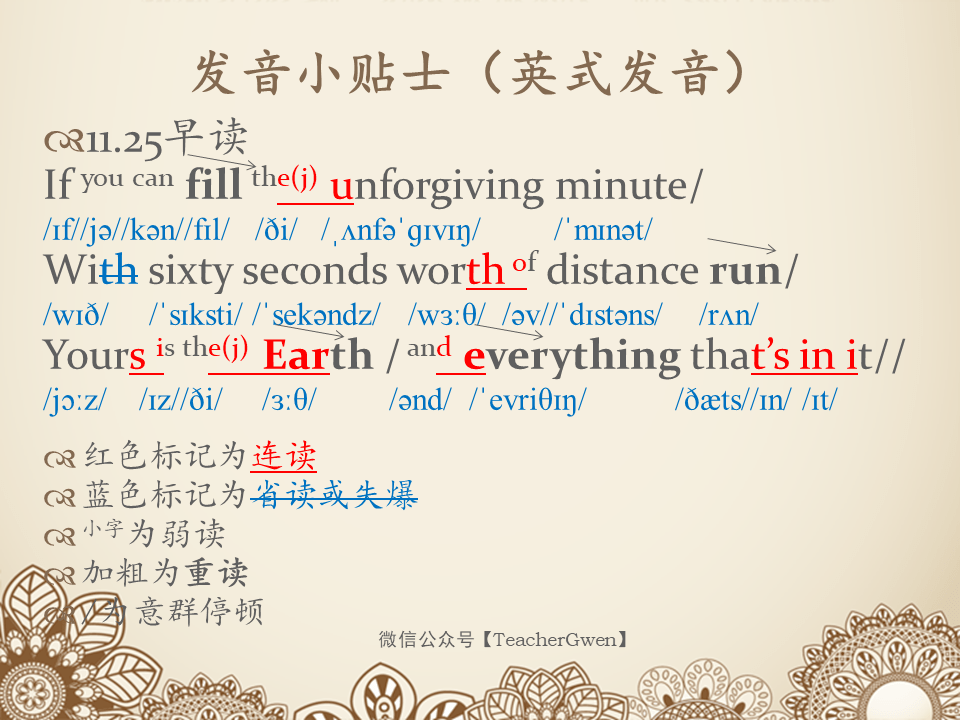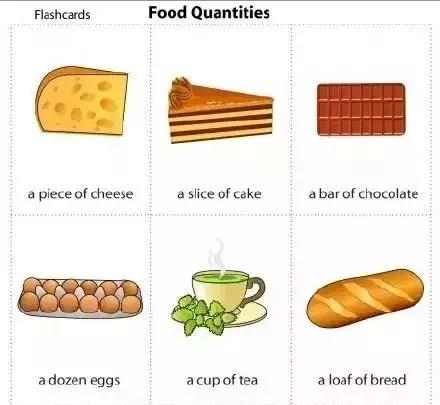亲爱的老师们 ♥
又双叒叕到了开学季,我们为大家梳理了 牛津版七年级下册的重点单词、短语、句型、语法和话题作文!
老师们可以转发给学生提前预习,为新学期做好准备!
上篇回顾: 速来围观!这 9 位教师的开学第一课别样精彩~
本篇放送:牛津版九年级下册重点短语 + 重点句型 + 重点语法 + 单元作文
Unit 1
★重点单词
1.next to 紧挨着
2.in the centre of ... 在……的中心
3.have fun with ... 和……玩得开心
4.the capital of ... ……的首都
5.on the seventh floor 在七楼
6.chat with sb 跟某人聊天
7. live in 居住在
8. want to do sth 想要做某事
9. watch TV 看电视
10. wash one's face 洗脸
11. have dinner 吃晚饭
12. cook meals 做饭
13. look out at 往外看
14. one's own bedroom 某人自己的卧室
15. take a message 捎个口信
16. at the foot of a hill 在山脚下
17. on the ground floor 在底楼
18. of one's own 某人自己的
19. be different from 和……不同
20. be full of 充满
21.square metre 平方米
22.have an area of 占地
23.some day 某天
24.thanks for 感谢
★词语点将台
★ country
1. country 作名词,在本课中意为“国家”,如例句 1。
2. country 作名词,还有“乡下 / 乡村”的意思,如例句 2。
【例句】
1. English is not the first language in Asian countries.
在亚洲国家,英语不是第一语言。
2. Peter often visits his grandparents in the country at the weekend.
皮特经常周末去看望在乡下的祖父母。
★share
share 作动词,意为“分享;合用”。常用搭配为 share sth with sb 意为“与某人共用 / 分享某物”。
【例句】
1. No one wants to share the work with me.
没有人想要和我分担这项工作。
2. Do you share your sadness with your family?
你和你的家人分享你的悲伤吗?
★own
1. own 作形容词,意为“自己的”,如例句 1;of one's own 为固定搭配,意为“某人自己的”,如例句 2。
2. own 也可以作动词,意为“拥有”,如例句 3。
【例句】
1. Bob has his own ideas about life.
对于生活,鲍勃有他自己的想法。
2. I have a flat of my own.
我有自己的公寓。
3. My father owns a big farm.
我爸爸拥有一家大农场。
★语法点击
基数词和序数词的比较
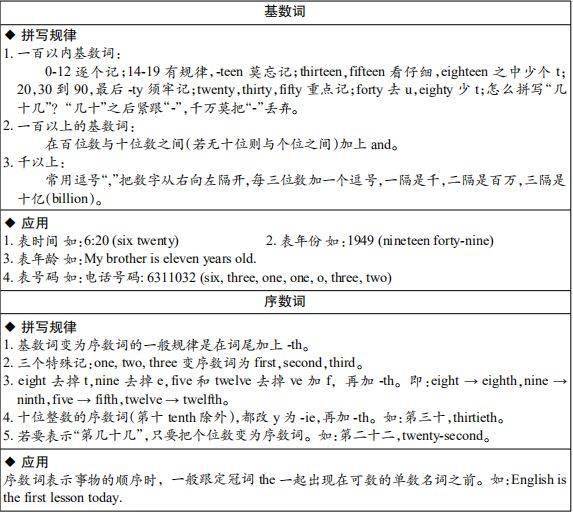
★写作一招鲜
Step 1 写作任务
请以“My dream home”为题,向大家简要介绍一下你梦想中的家,不少于 70词。
Step 2 抛砖引玉
★ 参考词汇:bright;comfortable;garden;colorful
★ 参考短语:sitting room;dinning room;make delicious food;music room;play the piano
Step 3 思路点拨
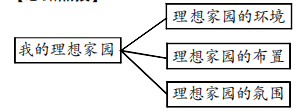
Step 4 范文展示
My dream home
My dream home is not very large, but it should be bright and comfortable. It has a big garden. There are many tall trees and colorful flowers in it.
It has two floors. On the ground floor, there is a sitting room, a kitchen and a dinning room. I can watch TV in the sitting room. My mother can make delicious food for us in the kitchen. There are three bedrooms and a bathroom on the first floor. I have a big bedroom and a music room, because I am very interested in playing the piano.
What do you think of my dream home?
Unit 2
★重点单词
1.do some shopping 购物
2.all kinds of 各种
3.visit neighbours 拜访邻居
4.different skills 不同的技能
5.a computer engineer 一位电脑工程师
6.college students 大学生
7. have a meeting 开会
8. clean the flat 打扫公寓
9. most of 大部分
10. in one's neighbourhood 在某人附近
11. help each other 互相帮助
12.far away from her home 离她家远
13.by train 乘火车
14.将来 in the future
15.擅长 be good at
16.turn on 开(电器按钮等)
17.more or less 或多或少;差不多
18.再一次,重新,重复 over again
19.看下列信息 look at the information below
20.make you feel better 使你感觉更好
21.worry about 为……担心
★词语点将台
★help
1. help 作动词,意为“帮助,帮忙”。常用结构为:help sb (to) do sth 或 help sb with sth,意为“帮助某人做某事”,如例句1、例句 2。
2. help 也可以作名词,意为“帮助,帮忙”。常用结构为:with one's help 或 with the helpof sb,意为“在某人的帮助下”,如例句 3。
3. help 的形容词为 helpful,意为“有用的”,如例句 4。
【例句】
1. Shall we help the old man to do some housework?
我们帮这个老人做些家务吧?
2. I often help my mother with cooking.
我经常帮我妈妈做饭。
3. I am doing my homework with my father's help.
我正在我爸爸的帮助下写作业。
4. I think the mobile is very helpful.
我觉得手机非常有用。
★fix
fix 作动词,意为“修理”,如例句 1;也可意为“使固定”,如例句 2。
【例句】
1. I spend 20 yuan fixing the bike.
我花了 20 元修自行车。
2. I need some glue to fix the picture to the wall.
我需要一些胶水来把这张画固定在墙上。
★someone&anyone
someone 意为“某人”,通常用于肯定句中,如例句 1;在否定句或疑问句中,通常用anyone,如例句 2;anyone 用于肯定句中通常表示“任何人”,如例句 3。
【例句】
1. Listen! There is someone singing in the living room.
听!有人在客厅唱歌。
2. There isn't anyone in the swimming pool in winter.
冬天游泳池一个人也没有。
3. It's not a difficult job. Anyone can do it.
这是份不难的工作,任何人都可以做。
★语法点击
一般将来时
一般将来时表示在将来某一时间发生的动作或存在的状态,它常与 tomorrow, the day after tomorrow, next month, inan hour 等表示将来的时间状语连用。一般将来时常用“will / shall + 动词原形”或“begoing to + 动词原形”结构来表示。
一、will / shall + 动词原形
“will / shall + 动词原形”表示客观上势必将发生的事情,will 用于各种人称,shall 只用于第一人称。否定句在 shall /will 后加 not,一般疑问句将 will / shall 提前至句首。
【例句】
1. My mother won't go to work the day after tomorrow.
我妈妈后天不上班。
2. — Will your father go home in an hour?
— Yes, he will. / No, he won't.
— 你爸爸会在一小时之后回家吗?
— 是的,他会。/ 不,他不会。
二、be going to+动词原形
“be going to + 动词原形”表示按计划、安排要发生的动作或根据某种迹象可能要发生的动作。be 随主语人称和数的变化而变化。否定句在 be 后加 not,一般疑问句将 be 提前至句首。
【例句】
1. Look at the sky. It's going to be a sunny day.
看天空。这将是一个阳光明媚的日子。
2. Our class is not going to have a class trip tomorrow.
我们班明天不会去班级旅行。
3. — Is Bill going to Beijing to spend his holiday next week?
— Yes, he is. / No, he isn't.
— 比尔打算下周去北京度假吗?
— 是的,他打算去。/ 不,他没有打算去。
★写作一招鲜
Step 1 写作任务
假设李华是你的邻居,他是一名电脑工程师,经常帮助社区的居民,请你以“My neighbour”为题,向大家介绍一下李华。
Step 2 抛砖引玉
★参考词汇:neighbour, engineer, community, volunteer,check, fix, helpful, friendly
★ 参考短语:do some volunteer work, help sb do sth,want to do
Step 3 思路点拨

Step 4 范文展示
My neighbour
Li Hua is my neighbour. He is a computer engineer.He often goes to the community center to do some volunteer work. He knows a lot about computers, so he often helps us check and fix computers. He can also help fix the bicycle. People in my community all think he is helpful and friendly. I also want to be a volunteer like him.
Unit 3
★重点单词
1.我的一位老朋友 an old friend of mine
2.在冰箱里 in the fridge
3.go to the supermarket 去超市
4.be far from ... 离……远
5.等一分钟 / 等一会儿 wait a minute
6.带某人去某地 take sb to ...
7.exchange student 交换生
8.school's football field 学校足球场
9.购物中心 shopping mall
10.本地人 local people
11.try some Chinese food 尝试一些中国食物
12.lots of ... 很多
13.看电影 watch films
14.欢迎来到某地 welcome to ...
15.nice but expensive 好但是贵
16.go shopping 去购物
17.乘地铁 by underground
18.欣赏京剧 enjoy Beijing opera
19.Western restaurants 西餐厅
20.raise cows 饲养奶牛
21.种麦子 grow wheat
22.row a boat 划船
23. show you around 带你参观
24.互相 each other
★词语点将台
★famous
famous 原由网是形容词,意为“出名的,著名的”,如例句 1。其常用短语“be famous for”为“因……而出名/著名”,如例句2“;be famousas”意为“作为……而出名”,如例句 3。
【例句】
1. Alice wants to be a famous dancer in the future.
爱丽丝将来想成为一位有名的舞蹈家。
2. The area is famous for its green tea.
这个地区以产绿茶而著称。
3. He is famous as a children-story writer.
他作为儿童故事作家而著称。
★miss
miss 作动词,意为“错过;失去”,其意思相当于 fail to catch,如例句 1。此外,miss 作动词时,还可以意为“想念”,后面接名词、代词或动名词(v-ing),如例句 2,3。
【例句】
1. If you don't get up now, you will miss the school bus.
如果你现在不起床,那么你就要错过校车了。
2. I am going to miss my grandmother every day.
我会每天想念我的祖母。
3. I miss living with my parents in Beijing.
我想念与父母在北京的生活。
★soon
soon 是副词,意为“很快,不久”,强调时间之短,如例句 1。How soon 意为“还要多久”,用来对将来时的“in + 一段时间”进行提问,如例句 2。
【例句】
1. I hope you'll get better soon.
我希望你不久就可以好起来。
2. — How soon will the Greens come back?
— In a week.
— 格林一家人还要多久回来?
— 一周之后。
★语法点击
名词所有格
★ 在英语中,带“’s”或“’”的名词就是名词所有格,也被称为’s 所有格。它用来表示所属关系,常意为“……的”。常用于名词前起修饰作用,也可把其后的名词省略。其功能类似于物主代词。
★ (1) 不以 -s 结尾的名词,无论单数还是复数,均在词尾加“’s”。如:Children's Day 儿童节;(2) 以 -s 结尾的名词,无论单数还是复数,均在词尾加“’”。
【例句】
your teachers'names.
你老师们的名字.
(3) 以 -s 结尾的姓名的所有格,在词尾加“’s”。
【例句】
James's sister 詹姆斯的妹妹。
★ 如果所属物是两个人(物)或几个人(物)共有时,只需在最后一个名词后加“’s”,且其后的名词要用单数;如果两个人(物)或几个人(物)各自拥有某物时,需要在每个名词后分别加“’s”,且其后的名词要用复数。
【例句】
Lily and Lucy'sroom
莉莉和露西的房间 (两人共用一个房间)。
Lily's and Lucy's beds
莉莉和露西的床(两人各自拥有一张床)。
物主代词
★ 表示所有关系的代词叫做物主代词,也叫人称代词的所有格。其分为形容词性物主代词和名词性物主代词。
★ 物主代词有人称和数的变化。具体变化见下表:
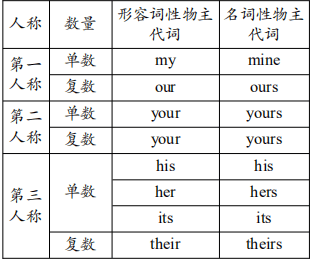
★ 形容词性物主代词相当于形容词,置于名词前作定语,起修饰作用,不可单独使用;名词性物主代词相当于名词,在句子中用作主语、宾语或表语,相当于形容词性物主代词加上名词,即:名词性物主代词 = 形容词性物主代词 + 名词。
【例句】
This is his hat. = This hat is his.
这是他的帽子。
★写作一招鲜
Step 1 写作任务
请以“My hometown”为题,向大家简要介绍一下你的家乡,要求语句通顺,70 词以上。
Step 2 抛砖引玉
参考词汇:beautiful, fresh, quiet
参考短语:a long history, all over the place, places of interest
Step 3 思路点拨
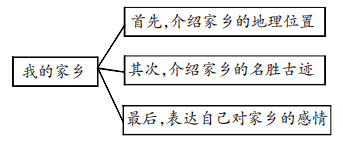
Step 4 范文展示
My hometown
Welcome to my hometown. My hometown is a quiet and small town in Jiangsu Province. It is close to the Yellow Sea. It has a long history. The air here is very fresh, and the sky here is very clean and blue. You can see beautiful flowers and trees all over the place. The streets are very wide and clean. There are not many factories here. There are some shopping malls and a big park. Also, there are many places of interest in my hometown. Many people come to my hometown for a visit every year. I love my beautiful hometown.
Unit 4
★重点单词
1.follow me 跟着我
2.go down 下去
3.害怕 be afraid
4.跟我来 come with me
5.have to 不得不
6.go up 上去
7.远离 far away from
8.在……前面 in front of
9.lie down 躺下
10.整天地 all day long
11.jump around 跳来跳去
12.walk past the house 走过那个房子
13.under the ground 在地底下
14.在出口 A 处出来 get out at Exit A
15.在红绿灯处 at the traffic lights
16.an English Corner 一个英语角
17.at the first crossing 在第一个十字路口
18.在街道的拐角处 at the corner of the street
19.为……准备…… prepare ... for ...
20. plenty of 大量
21.look forward to 期待
22.紧邻 next to
23.直走 walk straight on
24.cross the street 穿过街道
25.on the left 在左边
★词语点将台
★follow
follow 用作动词,意思为“跟随,跟着;追随”,如例句 1、2。此外,follow 作动词还可以表示“沿着”,如例句 3。
【例句】
1. They will follow the guide to visit the Ocean Park.
他们将跟着导游去参观海洋公园。
2. It's not good for the students to follow the fashion.
学生赶潮流没有什么好处。
3. Follow this road until you get to the post office,and then turn right.
沿着这条路一直走到邮局,然后右拐。
★remember
remember 作动词,意为“回想起;记得;记起”,后面可接名词作宾语,如例句1“;rememberdoing sth”意为“记得做过某事”,指事情已经做过,如例句 2;“remember to do sth”表示“记得要去做某事”,指事情还没有做,如例句 3。
【例句】
1. He doesn't remember my telephone number.
他没记住我的电话号码。
2. I remember closing the windows before leaving home.
我记得我离家之前关窗了。
3. Remember to buy some fruit for your mother.
记得给你妈妈买一些水果。
★laugh
laugh 意为“笑,大笑”,既可以作动词,又可以作名词,如例句 1、3;固定短语“laugh at”意为“嘲笑”,如例句 2。
【例句】
1. The TV show is very funny so I can't stop laughing.
这个电视节目太有趣了,所以我一直笑个不停。
2. She is always shy because she is afraid others will laugh at her mistakes.
她总是害羞,因为她害怕别人嘲笑她的错误。
3. Come to the party — it should be a good laugh.
来参加聚会吧,一定会很开心的。
★语法点击
冠词
冠词放在名词的前面,起限定作用。冠词包括不定冠词 a, an 和定冠词 the。
一、不定冠词
不定冠词 a 和 an 都用在单数可数名词前,意为“一个、一只、一辆……”,常用来泛指某人或某物。a 用于以辅音音素开头的单数可数名词或名词词组前;an 用于以元音音素开头的单数可数名词或名词词组前。例如:a lovely dog 一只可爱的狗;an old man 一位老人。
二、定冠词
定冠词 the 用在名词前,有以下几种用法:
1. 用来特指某(些)人或某(些)物,单复数均可。
【例句】
The man in the black coat is my uncle.
穿黑色外套的那个人是我叔叔。
2. 用在上文中提到过的人或物前。
【例句】
I'm reading a book. The book is really interesting.
我正在读一本书。这本书很有意思。
3. 用在谈话双方都知道的人或物前。
【例句】
Where is the little boy?
那个小男孩去哪了?
方位介词
方位介词是用来表示事物之间方位关系的介词,我们常用方位介词来说明人或物所处的位置。例如:
1. in front of 意为“在……前面”,其反义词为behind,意为“在……后面”
【例句】
There is a school in front of the hospital.
医院前面有一个学校。
2. outside 意为“在……外面”,其反义词为 inside,意为“在……里面”
【例句】
The boy is waiting for his mother outside the supermarket.
那个男孩正在超市外面等他妈妈。
3. above 意为“在……上方”,其反义词为below,意为“在……下方”
【例句】
The plane flies above the clouds.飞机在云层上面飞行。
4. under 意为“在……下方”,其反义词是 over,意为“在……上方”
【例句】
His football is underthe table.
他的足球在桌子底下。
5. between 意为“在……(两者)之间”,常用结构 between ... and ... 表示“在……与……之间”
【例句】
There is a post office between the shop and the pay phone.
在那个商店和公用电话亭之间有一家邮局。
6. beside / next to / near 意为“在……旁边 / 附近”,例如:There is a lake beside my house.我家旁边有一个湖。除此之外方位介词还有:at 意为“在……处(较小地点)”;in 意为“……里面”,表示在含有空间感的范围或物体之中;on 意为“在……上面”,表示与物体表面接触。
★写作一招鲜
Step 1 写作任务
假如你是周琪,你计划本周六跟朋友一起去阳光公园野餐。请根据以下提示,给你的好朋友张梅写一封邀请函。
1. Who will you have the picnic with?
2. When and where will you have the picnic?
3. What should Zhang Mei take for the picnic?
4. How can Zhang Mei get to the park?
Step 2 抛砖引玉
参考词汇:invite; drinks
参考短语:plan to do; have a picnic; prepare ...
for ...; plenty of; by underground; wait for; look forward to ...
Step 3 思路点拨
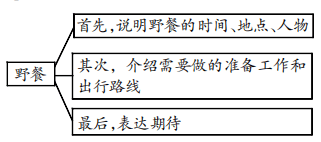
Step 4 范文展示
Dear Zhang Mei,
It is going to be a fine day this Saturday. So I plan to have a picnic in the Sunshine Park with some friends. And I would like to invite you to go with us. We will prepare plenty of food and drinks for the picnic. So you only need to take some fruit. You can go there by underground. I will wait for you at Exit A. I'm looking forward to meeting you then.
Yours,
Zhou Qi
Unit 5
★重点单词
1.the same size 相同的尺寸
2.from birth 从出生开始
3.在……后部 in the back of
4.照例;像往常一样 as usual
5.sit down 坐下
6.turn around 转身;使(翻转)
7.在……路上 on one's way to
8.自言自语 say to oneself
9.listen carefully 仔细听
10.take ... to... 带……去……
11.那天晚些时候 later that day
12.动物中心 the animal centre
13.live without water 离开水生活
14. know more about sb / sth 告诉某人某事
15.害怕 be afraid of
16.那天;前几天 the other day
17.at the same time 同时
18.all over the world 遍及全世界
19.至少 at least
20.请求;要 ask for
21.play cards 打牌
22.a piece of 一片
★词语点将台
★ birth
birth 为名词,意为“出生,诞生”。atbirth 意为“在出生时”;give birth to 意为“生(孩子)”。
【例句】
1. His brother is deaf from birth.
他的弟弟一出生就失聪了。
2. My mother said I weighed about three kilos at birth.
我妈妈说我出生时体重三公斤左右。
3. My aunt is going to give birth to a baby.
我姑姑就要生孩子了。
★reply
reply 作名词时,意为“答复,回复”,如例句 1;reply 作不及物动词时,后可跟介词 to,如例句 2;作及物动词时,后可跟that 引导的宾语从句,如例句 3。
【例句】
1. Three days later, he received the manager's reply.
三天之后,他收到了经理的回复。
2. I have no time to reply to so many emails.
我没有时间回复这么多电子邮件。
3. He replied that he was happy to have a picnic with us.
他回复说他很高兴和我们一起去野餐。
★happen
happen 作不及物动词,意为“发生”,如例句 1;sth happen(s) to sb 意为“某人发生什么事”,如例句 2;happen to do sth 意为“碰巧做某事”,如例句 3。
【例句】
1. Nobody knows what will happen in the future.
没有人知道将来会发生什么。
2. Parents don't want anything bad to happen to their children.
父母不想让任何不好的事情发生在他们的孩子身上。
3. My mother happened to go out when my uncle called.
我叔叔打电话的时候我妈妈碰巧不在家。
★语法点击
一般过去时
一般过去时表示过去某个时间发生的动作或存在的状态,它常与 yesterday,last night,in + 过去年份,two days ago,just now等表示过去的时间状语连用。
【例句】
1. I went to the cinema with my classmates yesterday.
昨天我和我的同学们去看电影了。
2. My sister started learning to play the guitar in 2014.
我妹妹从 2014 年开始学习弹吉他。
3. My parents went to Shanghai three days ago.
我父母三天前去了上海。
4. Uncle Wang called my father just now.
王叔叔刚才给我爸爸打电话了。
动词过去式的变化规则:
(1) 规则变化:
① 一般的动词在末尾直接加 ed。
【例句】
work—worked,clean—cleaned。
②以不发音的 e 结尾的动词,在末尾直接加d。
【例句】
live—lived,hope—hoped。
③以一个辅音字母结尾的重读闭音节动词,先双写这个辅音字母,再加 -ed。
【例句】
stop—stopped,fit—fitted。
④以辅音字母加 y 结尾的动词,先变 y 为 i,再加 ed。
【例句】
reply—replied,carry—carried。
(2)不规则动词的过去式需特殊记忆。
【例句】
is / am—was,are—were,do—did,have /has—had,go—went。
还有一些动词的过去式与动词原形一样。
【例句】
let—let,read—read。
★写作一招鲜
Step 1 写作任务
尼克胡哲(Nick Vujicic)1982 年出生于澳大利亚。他从出生时就没有四肢,因此经常被同学们嘲笑。但是经过不断地努力,胡哲考上了大学,并且成为了一名世界著名的演讲家(speaker)。请你以“An amazing speaker”为题,写一篇不少于 70 词的文章,向大家介绍一下尼克胡哲。
Step 2 抛砖引玉
参考词汇:college; famous; problem
参考短语:was born + 时间; from birth; laugh at; because of; as well as; all over the world; learn from
Step 3 思路点拨

Step 4 范文展示
An amazing speaker
Nick Vujicic was born in 1982 in Australia. He has no arms and legs from birth. When he was a student, his classmates often laughed at him because of it. But with his hard work, Vujicic can do many things as well as others. He also entered college and became a famous speaker all over the world. So when we have problems in life, we should learn from Vujicic.
Unit 6
★重点单词
1 .快点,赶快 hurry up
2.去野营 go camping
3.look up 向上看
4.take ... out of ... 把……从……拿出来
5.站起来 stand up
6.追赶 run after
7.get away 逃脱;离开
8.put into 放入
9.跳下去 jump down
10.撞到地上 hit the ground
11.all around 四周
12.on the other side 在另一边
13.用木头做一只鸟 make a bird out of wood
14.从那时起 from then on
15.in the 13th century 在13世纪
16.use bamboo to make kites 用竹子制作风筝
17.因……而变得著名 become famous for ...
18.足够……去做某事 ... enough to do sth
19.walk towards the door 走向大门
20.taste sweet 尝起来甜
21.感觉有一点不舒服 feel a little ill
22.太……以致不能…… too ... to ...
23.climb up 爬上去
24.forget about the key 忘记www.58yuanyou.com钥匙
★词语点将台
★fall
fall 用作动词时,意为“落下,掉落;倒”,如例句 1;fall off 意为“从……掉下”,如例句 2;fall 还可用作连系动词,意为“变得”,后接形容词 asleep,ill 等作表语,如例句 3;fall asleep 意为“入睡”;fall ill 意为“生病”。
【例句】
1. My keys fell into the river.
我的钥匙掉到了河中。
2. Mr Smith fell off the tree.
史密斯先生从树上摔了下来。
3. She fell asleep as soon as she got into bed.
她一上床就睡着了。
★alone&lonely
alone 既可用作形容词,又可用作副词,意为“独自的(地)、单独的(地)”,侧重于说明独自一人,如例句 1、2;lonely 只用作形容词,意为“荒凉的;孤独的,寂寞的”,它在句中既可作定语,也可作表语,如例句 3、4。
【例句】
1. She is alone in the kitchen now.
她现在独自一人在厨房里。
2. She doesn't like going out alone at night.
她不喜欢夜晚单独外出。
3. The lonely old man often travels.
这个孤单的老人经常旅行。
4. We never feel lonely with our family.
和家人在一起我们从不感到孤独。
★notice
notice 作动词时,意为“注意,察觉”。noticesth 意为“注意到某物”,如例句 1;notice sb dosth 意为“注意到某人做过某事”,强调做过的动作,如例句 2;notice sb doing sth 意为“注意到某人正在做某事”,强调正在进行的动作,如例句 3。
【例句】
1. I noticed a beautiful model car on the table in her house.
我注意到她家桌子上有一个很漂亮的汽车模型。
2. I noticed the thief steal your bag.
我注意到这个小偷偷走了你的包。
3. When I passed by, I noticed my neighbor watering the flowers.
当我经过的时候,我注意到我的邻居正在浇花。
★语法点击
一般过去时
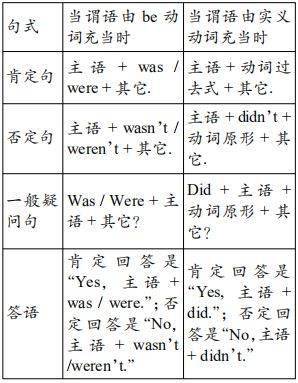
【例句】
1. There was a swimming pool in front of Peter's house last year.
去年彼得的房子前面有一个游泳池。
There was not a swimming pool in front of Peter's house last year.
去年彼得的房子前面没有游泳池。
— Was there a swimming pool in front of Peter's house last year?
去年彼得的房子前面有游泳池吗?
— Yes, there was.
是的,有。
/ No, there wasn't.
不,没有。
2. Jack went to Lily's birthday party yesterday.
昨天,杰克去了莉莉的生日聚会。
Jack didn't go to Lily's birthday party yesterday.
昨天,杰克没有去莉莉的生日聚会。
— Did Jack go to Lily's birthday party yesterday?
昨天,杰克去莉莉的生日聚会了吗?
— Yes, he did.
是的,他去了。
/ No, he didn't.
不,他没有去。
★写作一招鲜
Step 1 写作任务
假如你是 Mark,上周六你和朋友们去郊游了。请你根据下面的提示,写一篇短文,记叙一下你们的郊游经历,可适当发挥。
提示:
1. Where did you go?
2. How did you get there?
3. What activities did you do there?
4. How did you feel?
Step 2 抛砖引玉
参考短语:have a trip to, sunny and warm, row
a boat, have a picnic, fly a kite, tired but happy
Step 3 思路点拨
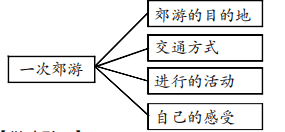
Step 4 范文展示
I had a trip to the West Hill last Saturday. The weather was sunny and warm. My friends and I left in the early morning. It took us half an hour to ride there. We did many interesting activities there. First, we rowed a boat on the lake. Then we had a picnic there at noon.At last we flew kitesin the afternoon. We all enjoyed ourselves. Everyone was tired but happy. We hope we can go there again.
Unit 7
★重点单词
1.信不信由你 believe it or not
2.留神,当心 look out
3.clean up the park 打扫公园
4.give a seat to someone 给某人让座
5.为……付款 pay for ...
6.独自在家 at home alone
7.next door 在隔壁
8.in hospital 住院
9.为……筹钱 raise money for
10.听见某人正在做某事 hear someone doing sth
11.put out the fire 灭火
12.rush into 冲进……
13.远离…… keep away from ...
14.在那个时刻 at that moment
15.pour ... over ... 将……倒在……上
16.plant trees 种树
17.在贫困地区 in poor areas
18.send ... to .... 把……发送给……
19.an old people's home 一家老年公寓
20.一个 7 岁的男孩 a seven-year-old boy
21.参加…… take part in ...
22.lose one's way 某人迷路了
23.by the way 顺便问一下
24.没问题 no problem
25.一个玩耍的好地方 a good place to have fun
26. make a call 打个电话
27.in need 在困境中
28.hear from 收到……的来信
29.most of the computer work 大部分电脑工作
30.这学期 this term
31. 在……方面努力 work hard on ...
32.do / try one's best 尽某人最大的努力
33.do well in ... 在……方面做得好
34.在……岁时 at the age of ...
★词语点将台
★able&ability
able 为形容词,意为“能,能够;聪明能干的,能力出众的”,如例句 1;be able to do sth 意为“能够做某事”,如例句 2;ability 为名词,意为“能力”,have the ability to do sth 意为“有能力做某事”,如例句 3、4。
【例句】
1. Behind an able man there are always other able men.
山外有山,人外有人。
2. My brother is able to swim.
我弟弟能够游泳。
3. She has the ability to read and write.
她有阅读和写作的能力。
4. The manager has never doubted her ability.
这个经理从未怀疑过她的能力。
★pay
pay 作动词时,意为“付费”,其后可接双宾语,表示“付给某人……”,如例句 1;pay for sth意为“为……付款”,如例句 2;pay ... for sb 意为“为某人支付……”,如例句 3。
【例句】
1. Mr Smith paid the milkman five dollars just now.
史密斯先生刚才付给牛奶工五美元。
2. Let me pay for lunch.
我来支付午餐吧!
3. I paid the cost of the dance classes for my daughter last week.
我上周为我女儿付了舞蹈课的费用。
★hurt
hurt 既可指肉体上的伤害,也可指精神上、感情上的伤害。作及物动词时,意为“(使)受伤、伤害(感情)”,如例句 1;作不及物动词时,意为“感到疼痛”,如例句 2;hurt 作形容词时,意为“受伤的”,如例句 3。
【例句】
1. Kelly fell back and hurt her head.
凯莉向后跌倒,把她的头跌伤了。
2. Don't knock on my head. That hurts.
不要敲我的头,那很疼。
3. The swallow was hurt and couldn’t fly any more.
这只燕子受伤了,再也不能飞了。
★语法点击
情态动词 can / could / may
can, could 和 may 三者都是情态动词,在句中均不能单独作谓语,其后必须接动词原形,与实义动词一起构成句子的谓语。三者都可表示“请求”与“许可”的含义。但
是在表示“请求”时,could 的语气要比 can和 may 委婉。
【例句】
Can we go and play football now?
我们现在能去踢足球吗?
Could you lend me some money?
你能借我点钱吗?
May I borrow your new bicyclwww.58yuanyou.come?
我可以借一下你的新自行车吗?
※can 和 could 还可以表示有干某事的“能力”。can 表示现在的能力,could 表示过去的能力,而 may 没有这层意思。
【例句】
Can you ride a bike?
你会骑自行车吗?
I could run very fast when I was a little girl.
当我是小女孩的时候,我可以跑得非常快。
What 和 How 引导的感叹句
在英语中,当我们想表示赞美、惊叹、喜悦、悲伤等强烈的感情时,我们使用感叹句。感叹句通常由 what 或 how 引导。what和 how 引导的感叹句一般情况下还可以相互转换。
※ What 引导的感叹句:What + (a / an) +adj. + 名词 + (主语 + 谓语)!
※ How 引导的感叹句:How + adj. / adv. +(主语 + 谓语)!
【例句】
What a difficult Maths problem it is!
= How difficult the Maths problem is
多难的一道数学题啊!
What beautiful flowers they are!
= How beautiful the flowers are!
这些花是多么美丽呀!
What fine weather it is!
= How fine //www.58yuanyou.comtheweather is!
多么晴朗的天气呀!
★写作一招鲜
Step 1 写作任务
假设你是 Tom,你们学校的英语俱乐部要招一名英语报作者。你认为你的好友王华是最佳人选。请你写一篇 70 词左右的推荐信,向俱乐部推荐王华。
Step 2 抛砖引玉
参考词汇:recommend 推荐,writer 作者,passage 文章,competition 竞赛
参考短语:be good at,keep a diary,win prizes, do well in,look forward to,hear from
Step 3 思路点拨
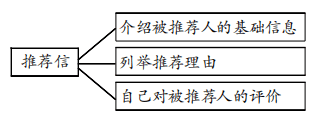
Step 4 范文展示
Dear Sir / Madam,
I would like to recommend Wang Hua for the English Newspaper's writer. She is a clever girl. She is very good at English writing and she likes to write. She keeps a diary in English every day. She won several prizes in English competitions. The students all like to read her passages.
Wang Hua always wants to join the English Club. She is kind and friendly. She often helps her classmates with their English. I think Wang Hua can do well in the English Newspaper. I am looking forward to hearing from you.
Yours faithfully,
Tom
Unit 8
★重点单词
1.feed her carrots 喂她的胡萝卜
2.play with ... 同……一起玩
3.教他说话 teach him to speak
4.张大眼睛 open one's eyes;
5.run after a ball 追球跑
6.look after ... 照顾……
7.到处寻找…… look around
8.bring me something to eat 给我拿点吃的来
9.swim around 到处游
10.把它握在我的手里 hold it in my hand
11.睡在我的膝盖上 sleep on my lap
12.直到结束 until the end
13.need a gentle touch 需要温柔的触摸
14.take care of ... 照顾
15.build sth out of sth 用某物建造某物
16.do wonderful tricks 做令人感到惊奇的事
17.get tired 累了
18.repeat my words 重复我的话
19.回到家 come back home
20.一直 all the time
21.once a day 一天一次
22.grow up 长大
23.制造一些噪音 make some noise
24.玩一个球 play with a ball
25.sleep anywhere 睡在任何地方
26.put ... in the sun 把……放在太阳下
★词语点将台
★hold
hold 作动词时,意为“抓、握”,如例句 1;意为“举行”,如例句 2;意为“容纳”,如例句 3。hold sth in hand 意为“抱住,握住”。hold a sports meeting 意为“举行运动会”;hold on (口语)意为“等一等;(打电话时)别挂断”。
【例句】
1. Hold your sister's hand while you cross the street.
当你过马路时,你要抓住你妹妹的手。
2. They will hold the meeting next Monday.
他们将会在下周一举行会议。
3. My box is too small to hold all these things.
我的箱子太小,装不了这么多东西。
★teach
teach 为动词,意为“教”。其后可接双宾语,常见搭配为 teach sb sth 意为“教某人某事”,如例句 1;teach oneself 意为“自学”,如例句 2;teach sb to do sth 意为“教某人做某事”,如例句 3。
【例句】
1. Can he teach us dancing?
他能教我们跳舞吗?
2. My grandmother can teach herself English.
我奶奶能自学英语。
3. My brother teaches me to drive a car these days.
我哥哥这些天在教我开车。
★fight
fight 作动词时,表示“打仗(架);与……打仗(架)”,后可直接接宾语,如例句 1;或跟 with接宾语,如例句 2;当表示“为……而奋斗(战斗)”时,通常与介词 for 连用,如例句 3。fight作名词时,意为“战斗;打架;吵架;斗志”,如例句 4。
【例句】
1. They must fight the enemy to safeguard their country.
他们必须与敌人作战来保卫他们的国家。
2. You shouldn't fight with your little sister.
你不应该和你的小妹妹打架。
3. People often have to fight for their freedom.
人们常常不得不为他们的自由而斗争。
4.He starteda fight with his classmate after school yesterday.
他昨天放学后和同学打了一架。
★语法点击
聚焦形容词
【定义】
形容词是用来描写或修饰名词的一类词,说明人或事物的性质、状态和特征。
【用法】
◆ 作定语:形容词可修饰名词作定语。
【例句】
She is a beautiful girl.
她是一个漂亮的女孩。
◆ 作表语:形容词也可置于系动词之后作表语。
【例句】
This storybook is very interesting.
(置于系动词 be 之后)
这本故事书很有趣。
My little sister became active from then on.
(置于表变化的系动词之后)
从那以后我的妹妹变得积极了。
The cake tastes good.
(置于感官系动词之后)
蛋糕尝起来不错。
◆ 个别形容词还可单独成句。
【例句】
— How are you today?
你今天好吗?
— Fine. Thank you.
很好。谢谢你
不定代词的用法
不定代词有四种,由 some-, any-, no-, every-与 -thing, -one, -body 等构成。
◆ 带 some- 的不定代词通常用于肯定句中,而带 any- 的不定代词一般用于否定句或疑问句中。
【例句】
— Is there anybody in the garden?
花园里有人吗?
— Yes, there is somebody in the garden.
是的,花园里有人。
◆ 在表示请求、提建议等带有委婉语气的疑问句或希望得到对方肯定答复的疑问句中,也用带 some- 的不定代词。
【例句】
Would you like something to eat?
你想要吃些东西吗?
◆ 带 no- 的不定代词有否定含义。
【例句】
There is nothing wrong with your ears.
你耳朵没毛病。
◆ 带 every- 的不定代词可用于各种句式中。
【例句】
Everybody likes delicious food.
每个人都喜欢美食。
【注意】
形容词修饰不定代词时应后置,即放在不定代词的后面。不定代词作主语时,谓语动词通常用单数形式。
★写作一招鲜
Step 1 写作任务
假设你是 Tom,你养了一只宠物狗。请你写一篇 60 词左右的短文,向大家介绍一下它吧。
Step 2 抛砖引玉
参考词汇:lovely, quiet, noisy, meat, bone
参考短语:three years old, at nighLeiLymPMWt
Step 3 思路点拨
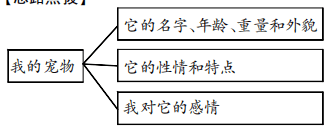
Step 4 范文展示
My pet
I'm Tom. I have a lovely dog — Tonny and he is three years old. He is about three kilograms. He has long and white fur with two big black eyes. He can smell very well, and his favorite foods are meat and bones. Most of the time Tonny is quiet,but sometimes he is noisy at night. He is a very cute dog and he is my best friend! I love him very much.
七年级下册的知识点分享到这里就结束了
老师们记得转发给学生哦
更多精彩
请持续关注 翼课网
声 明
责任编辑:聂 玲
校 对:姜 珊
审 核:贾丹彤
基础听说成绩几乎全班满分!佛山华英学校谢丹红:让信息技术成为教学 “利器”
中考英语100分+达线率48%!山西盐湖区实验中学借信息化教学乘风破浪
全班英语听力满分人数超 30 名,这位初三老师只做了三件事…… | Ekwing 案例
中考英语100分+达线率48%!山西盐湖区实验中学借信息化教学乘风破浪
一个月,中考英语提 16 分!临沂十一中教师许守梅借翼课网助学生跨越高分
用好数据!老师月考后这样总结,带领全班“逆袭”期中考!| Ekwing 支招

